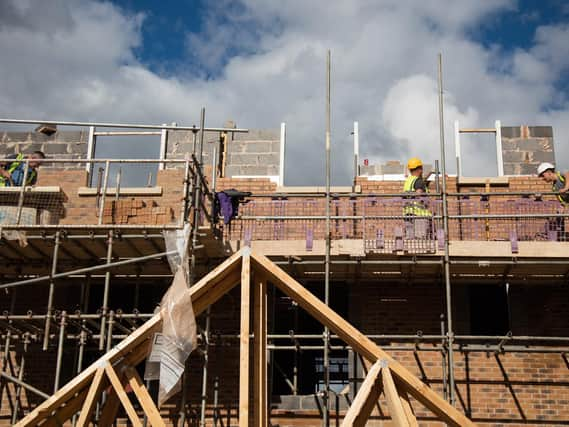Smaller developers set to suffer most after lockdown


Construction work on four out of five home building sites in the UK has stopped due to the lockdown, according to Savills.
While sites are officially allowed to remain open, few are able to adhere to strict safety and social distancing restrictions. There are also significant problems in sourcing building materials and a lack of subcontractors.
Advertisement
Hide AdAdvertisement
Hide AdThis has scuppered any chance of the Government achieving its ambition of building 300,000 new homes a year, up from the record 240,000 built in 2018-2019, the highest level in almost 30 years. Those ambitious targets are now the last thing on the mind of developers, who are working hard on strategies that might help them survive what could be a catastrophic time for some.
While most volume housebuilders have substantial cash reserves and low debt, most small to medium size developers do not. Helen Collins, head of department at Savills Affordable Housing Consultancy, says: “Once again it is SME builders and developers facing cash flow challenges. Many carry little cash reserves, yet play an important part in the industry and will need help to get through.”
Richard Conroy, CEO of Holmfirth-based Conroy Brook Group, which now incorporates Ben Bailey Homes, agrees: “The volume builders will have cash in the bank, large balance sheets and finance facilities that will see them through this.
“Most SME developers won’t have that. Some will be struggling within a month and they will have run out of cash within three months so there will be firms that will not come through this.
Advertisement
Hide AdAdvertisement
Hide AdWe are lucky because we have a bit of cash in the bank that should see us through and we are busy planning how we will achieve this. The first thing our bank wanted was a revised business plan.”
Conroy Brook is building homes at Wood Nook in Denby Dale, The Chase in Harrogate and Highfields in Derbyshire. “Like other developers, we can’t build houses, we can’t sell them and we have shut down our head office for social distancing reasons,” says Richard.
“What’s frustrating is that we have got houses that are ready to move into and customers who are desperate to buy them but parts of the chain that allows this to happen just aren’t there. There is no building inspection and solicitors are advising people not to proceed with buying.”
He believes that when restrictions are relaxed or lifted, getting back to full capacity is likely to be an issue for most construction sites. “You can’t just turn the tap back on again. It will take time for the construction supply chain to get back to normal and there will most likely be some distancing regulations for people working on site.
Advertisement
Hide AdAdvertisement
Hide Ad“Even if we start up again in June, we won’t see any income until July or beyond but we are hoping that the housing market will bounce back and the country won’t slip into recession.
“At the moment we are planning for the worst of what might happen and hoping for the best.”
Helen Collins suggests that some SMEs would benefit from a recapitalisation debt fund combined with equity. “This could perhaps be in the form of Homes England and the Greater London Authority buying live and pipeline sites direct or by grant-funding housing associations and local authorities to do so.
“Homes England and the GLA may need to step in to buy stalled sites, combining funding and resources to continue land, infrastructure works and planning to get sites moving again. If government agencies were to act as master developer, stalled sites could be used to support SME development.”
Advertisement
Hide AdAdvertisement
Hide AdShe adds that volume builders may also require further support to get back on track post-coronavirus.
“This could include extending the Help to Buy scheme and underpinning mortgage availability, perhaps through a government-backed mortgage lender to get the market moving again quickly.”
Helen also believes that to ensure the supply chain can get back to work, there will need to be an effective and wide scale coronavirus testing regime. “The road to recovery from the present hiatus will be tough but with the right information and targeted support, the housing sector can play a key role in helping Britain bounce back.”
Oliver Knight, senior analyst in Knight Frank’s residential research department, is hopeful that housebuilding will bounce back but says that the full impact of the construction hiatus imposed by coronavirus will depend on the duration of current movement restrictions and on the economy.
Advertisement
Hide AdAdvertisement
Hide AdHe adds:“Our current view remains that the disruption will be relatively short-term".
He also believes that an extension of time to implement planning permissions will help developers, along with flexibility with paying for payment of planning obligations.